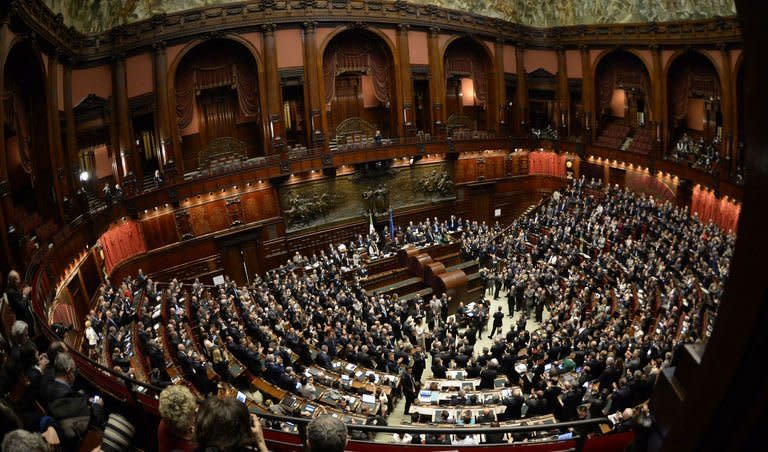Napolitano re-election raises hopes for new government
The re-election of Italy's 87-year-old president Giorgio Napolitano has raised hopes of an end to a two-month impasse on forming a new government but failed to answer calls for change, experts said on Sunday. Napolitano had ruled out standing again but changed his mind on Saturday, becoming the first president ever to do so after parliament proved incapable of electing another candidate and rival parties appealed to him for help. "In this context of a failure of politics they see him as the only resource that can overcome this systemic crisis," said Marzio Breda, a presidential politics expert for the top-selling Corriere della Sera daily. "Public opinion is becoming ever more distant from traditional politics," he said, after a rally outside the parliament building in Rome on Saturday drew thousands of people protesting against Napolitano's re-election. The parties have been at loggerheads ever since a general election in February that was narrowly won by the centre-left but failed to produce a parliamentary majority. "He can go on for one or two years and then he would resign. This too would be a first but the pope did it so the president can do it too," he said. Corriere della Sera editorialist Sergio Romano said: "We have reason to hope that this institutional novelty... will be a spur for the country to shed the pessimism of recent months." But Beppe Grillo, the leader of the anti-establishment Five Star Movement that came third in the February polls, on Sunday slammed the presidential re-election as institutional "trickery" concocted by leaders of the other main parties and Napolitano. "Parliament is an empty shell," the ex-comedian said at a Rome press conference, predicting that a new government would "not last more than a year" and confirming that his party would be in the opposition. Analysts said Napolitano would most likely move swiftly to set up a short-term government similar to the outgoing one of Mario Monti with a mandate to carry out much-needed reforms, although with a cabinet made up of both party political and "technocratic" ministers. Early elections would likely still have to be held but the prospect of a vote within months, which had raised concern on the financial markets, would be staved off. It would be "an emergency government", said Stefano Folli, columnist for business daily Il Sole 24 Ore, which has urged bickering politicians to act fast as Italy endures a painful recession that has triggered a social crisis. "Napolitano's decision has to be read as an impulse to political forces to act," Folli said, adding that his election with a sweeping majority showed there was a basis for a government with a "limited but concrete agenda". Analysts also noted that with his re-election Napolitano had re-gained the power to dissolve parliament and call early elections, since presidents are prevented from doing so in the last six months of their mandate. Napolitano "might stay for one or two years. It's as if the political system has bought time," said Mario Calabresi, editor of La Stampa daily. "But if this time is used just to stay in this paralysis then the country will be even more angry, tired, exhausted and stuck in one or two years. "This time has to be best used to provide answers to the citizens," he said. Il Sole-24 Ore editor-in-chief Roberto Napoletano wrote Sunday: "We fervently hope that (Napolitano's) re-election is not just a Bandaid on a deep wound, an aspirin to lower the fever, or even worse a way to gain time and put off solutions." In a scathing editorial for Il Fatto Quotidiano daily, columnist Peter Gomez said the re-election was an ominous sign. "Faced with the economic and social decomposition of the country ... the political class could only reply with the status quo," he said, adding that this showed the "comatose delirium of omnipotence" of the political parties. Gomez said Napolitano's most likely choice for prime minister would be Giuliano Amato, a veteran political operator and former prime minister who is frequently mentioned as a neutral figure who could preside over a cross-party deal. "Stay strong. The worst, unfortunately, is yet to come," Gomez said.



